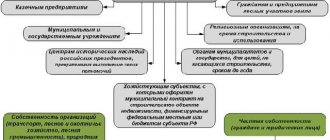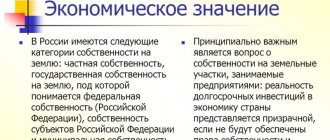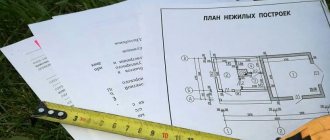Current legislation provides for the following types of rights to a land plot:
1) right of ownership (Article 260 of the Civil Code of the Russian Federation, Article 15 of the Land Code of the Russian Federation); 2) the right to lifelong inheritable ownership of a land plot (Article 265 of the Civil Code of the Russian Federation); 3) the right to permanent (indefinite) use of a land plot (Article 39.9 of the Land Code of the Russian Federation, Article 268 of the Civil Code of the Russian Federation); 4) free use of a land plot (Article 24 of the Land Code of the Russian Federation); 5) the right to limited use of other people’s land plots (easement) (Article 274 of the Civil Code of the Russian Federation, Article 23 of the Land Code of the Russian Federation); 6) lease of land plots (Article 22 of the Land Code of the Russian Federation).
The basis for the emergence of the right of lifelong inheritable ownership of a land plot
The right of lifelong inheritable possession is one of the limited real rights (Article 216 of the Civil Code of the Russian Federation).
Despite the name of Article 265 of the Civil Code of the Russian Federation, it does not contain grounds for acquiring the right to lifelong inheritable ownership of a land plot; it only refers to land legislation. However, the Land Code of the Russian Federation does not contain such type of property rights as the right of lifelong inheritable ownership of a land plot. Currently, there is only one basis for the emergence of the right to lifelong inheritable ownership of a land plot, it is inheritance by law or by will.
The subjects of the right of lifelong inheritable ownership can only be citizens (individuals), and the object can only be a land plot owned by a public entity.
By virtue of clause 3 of Art. 5 of the Land Code of the Russian Federation, persons who own and use land plots on the right of lifelong inheritable ownership are classified as a special category of participants in land relations - landowners.
Permitted methods of disposal of the site
The land user has a narrow range of powers to dispose of the site. It is impossible to conclude a formal agreement on exchange, rental or sale. But in practice this happens. The copyright holder verbally agrees with the person on the period and amount of monthly payment.
The ability to own a plot is inherited (Article 267 of the Civil Code of the Russian Federation). Succession is assumed by law, by will. In two cases, it is necessary to provide a certificate of inheritance as confirmation. The document is issued by a notary.
The next owner of the site will be a potential successor. If the property represents a large part of the inheritance, then it is more logical to establish compensation. The problem is the lack of legal regulation of the issue. Therefore, no compensation payments are provided. The issue is resolved on an individual basis.
It is impossible to sell the plot separately. Cannot be sold or given away. Prohibitions do not apply to real estate located on land. For example, a private house can be easily sold. The transaction does not contradict the law and is absolutely legal. The fact of transfer of rights to an erected house or building is the reason for the transfer of ownership of the plot.
Easement
It is an agreement for the temporary use of land in previously agreed upon situations. Within the framework of the law, an easement allows the owner of a neighboring territory, in some cases, to enter a nearby plot. The right should minimally burden the land owner.
There are two types of easements:
- public;
- private.
The first is established by regulations of local governments (Article 64 of the Civil Code of the Russian Federation) or at the federal level. The public type of property law is introduced based on the results of public hearings and pursues the interests not of specific people, but of the state.
A private easement arises by agreement concluded between the owners of adjacent plots or in court. For example, a neighbor needs to take water from a well; to do this, he needs to cross someone else’s territory. A private easement pursues exclusively personal interests and does not affect government agencies in any way.
Rent
It represents the transfer of a plot of land into someone else’s temporary possession with the condition of providing a monthly payment. It is considered the most common form of land use.
The subjects of the agreement are individuals or legal entities. Here the legislation does not provide restrictions. Even foreign citizens or stateless persons can be parties to the lease agreement.
The main task specified in the text of the agreement is often the construction of a structure on the leased territory (Article 22 of the Land Code of the Russian Federation). After signing the transaction, the party undertakes to use the site only for its intended purpose.
Free use
The main difference is the absence of monetary compensation, that is, the party to whom the right of ownership is transferred does not have to provide material benefits in return. The following are issued for free use:
- state and municipal property;
- service plots;
- personal property of individuals and organizations.
The transfer period is negotiated by the parties independently. The law establishes a maximum period for the agreement to be valid.
An important condition of the transaction is the condition of the site. The party to whom the right of ownership is transferred is obliged to return the object in its original form in which the owner transferred it.
The right of lifelong inheritable ownership is retained by citizens who acquired it before the introduction of the RF Land Code
The right of lifelong inheritable ownership acquired by a citizen before the day of entry into force of the Land Code of the Russian Federation is preserved (Article 3 of Law No. 137-FZ “On the entry into force of the Land Code of the Russian Federation”). Consequently, the corresponding rights (Article 41 of the Land Code of the Russian Federation) and obligations (Article 42 of the Land Code of the Russian Federation) of the owners of such land plots are preserved.
The right of lifelong inheritable ownership was introduced at a time when private ownership of land did not exist. With the introduction of the Land Code of the Russian Federation and the right of private ownership of land, the right of lifelong inheritable ownership has lost its relevance and significance. Thus, after the entry into force of the Land Code of the Russian Federation (October 30, 2001), the right of lifelong inheritable ownership of land plots ceased to be granted, and currently it is retained by persons who received plots on this right before the entry into force of the Land Code of the Russian Federation, that is, until 1 March 2015. Before this date, there was an article in the Land Code of the Russian Federation devoted to the right of lifelong inheritable ownership (Article 21 of the Land Code of the Russian Federation), from 01.03.2005. she has lost her strength.
Rights and obligations of the owner
An individual with night vision equipment can operate the plot, while his activities are strictly regulated by law. In addition, the owner's rights are limited to the characteristics of the territory itself, specified in the documents. The nuances of land use of this form of ownership:
- Each segment has its own type of permitted use and category, which are fixed in Rosreestr - this can be viewed in the Extract from the Unified State Register of Real Estate. For example, it is prohibited to build enterprises or trade pavilions on land intended for individual residential construction or personal subsidiary plots.
- Certain restrictions may be imposed on real estate, also certified by documents - they must be observed.
- The PNV of a land plot must be registered with Rosreestr, while all data about the user and allotment is entered into the Unified State Register.
What the owner is allowed by law:
- Run private household plots, build a residential building, utility rooms, cultivate the land. If buildings need to be registered as private property, you need to contact the Cadastral Service for the region. A boundary plan will be issued for the land (if necessary, a survey procedure is carried out), and a technical plan for the building.
- You can dispose of an allotment only through transferring it to inheritance - by drawing up a will. In its absence, inheritance is carried out according to the law (by close relatives).
Powers of ownership and use of a land plot on the right of lifelong inheritable possession
The content of the right of lifelong inheritable ownership consists of the powers of ownership and use of a land plot.
In contrast to the right of ownership, the exercise of the right to dispose of a land plot is excluded. In other words, a plot owned by the right of lifelong inheritable ownership cannot be sold or donated . At the same time, the right of lifelong inheritable ownership can be transferred by inheritance.
Unless otherwise follows from the conditions for use of a land plot established by law, the owner of the land plot has the right to erect buildings, structures and other real estate on it, acquiring ownership of it (Clause 2 of Article 266 of the Civil Code of the Russian Federation).
Differences from ownership
The content of the Civil and Land Codes regulates the rights of landowners and land users.
The owner can own, use and dispose of his property, which means the possibility of concluding purchase and sale transactions, drawing up a gift agreement (Article 209 of the Civil Code of the Russian Federation). The owner of land in lifelong use is considered to be the state or municipal entity. Accordingly, citizens do not have the right to dispose of it at their own discretion. The only thing available to them is the transfer of land by inheritance (Article 267 of the Civil Code of the Russian Federation).
Termination of the right to lifelong inheritable ownership of a land plot
The grounds for termination of the right to lifelong inheritable ownership of a land plot are defined in Art. 45 of the Land Code of the Russian Federation.
Termination of the right of lifelong inheritable ownership in accordance with Art. 45 of the Land Code of the Russian Federation occurs in the case of:
- refusal by the landowner of his right to a land plot (the right to lifelong inheritable ownership of a land plot can be waived in accordance with clause 3 of Article 53 of the Land Code of the Russian Federation);
- forced termination of the right when using a land plot in violation of the requirements of the legislation of the Russian Federation;
- seizure of land for state or municipal needs.
Design features
Allotments were transferred to the PNV even before the modern Land Code was issued, and there were no special regulations on the procedure for their distribution among the population. For this reason, the boundaries and areas in the documents were indicated approximately - often less than in reality.
Therefore, you should not wait for verification by the Cadastral Service and order measurements of the site in advance - the actual dimensions must correspond to the documents. In case of discrepancy, a land surveying procedure is carried out and new data is entered into the State Register.
In the event that documents for the allotment are not issued upon registration, you must also contact Cadastral specialists to obtain an extract from the Unified State Register of Real Estate and other registration procedures. Their volume depends on the data available in the Register.
It is important to understand that the municipality does not have the right to exploit such land for its own purposes - unless there is a permitting regulatory act or a court decision. In the event that the deprivation of a plot of land occurs through no fault of the owner - for example, a special category is identified that is prohibited for use by individuals - the subject is paid compensation or given a new plot.
Inheritance of the right to lifelong inheritable ownership of a land plot
In accordance with Art. 1181 of the Civil Code of the Russian Federation, a land plot owned by the testator or the right of lifelong inheritable ownership of a land plot is included in the inheritance and is inherited on the general basis established by the Civil Code of the Russian Federation. No special permission is required to accept an inheritance that includes the specified property.
When inheriting a land plot or the right to lifelong inheritable ownership of a land plot, the surface (soil) layer, water bodies, and plants located on it within the boundaries of this land plot are also inherited, unless otherwise established by law.
In paragraph 74 of the Resolution of the Plenum of the Supreme Court of the Russian Federation “On judicial practice in cases of inheritance” it is stated that the inheritance includes and is inherited on a general basis the land plot owned by the testator or the right of lifelong inheritable ownership of the land plot (if the right a land plot belongs to several persons - a share in the right of common ownership of a land plot or a share in the right of lifelong inheritable ownership of a land plot).
The transfer of the right to lifelong inheritable ownership of a land plot is subject to state registration (based on a certificate of inheritance).
How to register land ownership
Sometimes it is surprising that the owner of the plot of land has not re-registered it as property. There can be quite a lot of reasons for this. The most common:
- the elderly landowner could not deal with paperwork;
- the person fundamentally did not want to privatize the land plot, not understanding the difference in legal status;
- documents for the site were lost, and the copyright holder did not know how to restore them, or was unable to do so;
- the copyright holder had already used his right to privatization earlier and could not carry out a free re-registration.
Keep in mind that the privatization of real estate was allowed only once in a lifetime. If a person has already participated in privatization, such a right will not be granted again.
Video: privatization of summer cottages and land plots
https://youtube.com/watch?v=ByGbaAn0lwA
What documents will be needed
For the procedure, you need to write an application to the administration of the locality with a request to transfer the land into ownership and collect a package of documentation, which includes:
- civil passport of the landowner;
- if a representative acts - a notarized power of attorney;
- an act on the allocation of land or a certificate of recognition of ownership of the land plot;
- land surveying;
- cadastral passport.
Plots that are not registered with the cadastral register cannot be transferred to the ownership of landowners.
Where to contact
The primary address of appeal is the administration of the locality where the storage facility is located. After the application is considered here, an extract from the decision of the administrative commission will be issued, and on its basis - an administrative act. It must be attached to the package of documentation, which should be taken to the MFC, where the registration of ownership will be carried out.
Amount of state duty and payment methods
For registration of property rights, a state fee of 2,000 rubles is paid. You can pay it in the following ways:
- through the government services website;
- via terminal;
- at a Sberbank branch.
After depositing the specified amount, you must receive a receipt confirming payment. It is not necessary to submit a receipt to the MFC registrar in the window - he receives this information in a special program when filling out documents for the appointment.
Terminals where you can pay the registration fee are installed in almost all territorial branches of the MFC
Termination of NVG
Conditions under which inherited ownership ceases to exist:
- The plot was registered as direct ownership - purchased from the municipality.
- The owner himself refuses the property or does not want to accept it as an inheritance.
- The memory was used in an inappropriate or inappropriate way (contradiction with the VRI, deterioration of the soil, neglect, environmental damage, etc.).
- Non-payment of land tax.
- Seizure of property due to an emergency.
A court decision must be made on the last two points - the issue is regulated by Article 54 of the Land Code of the Russian Federation.









